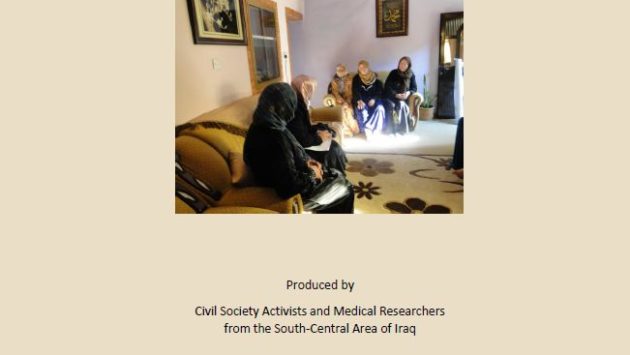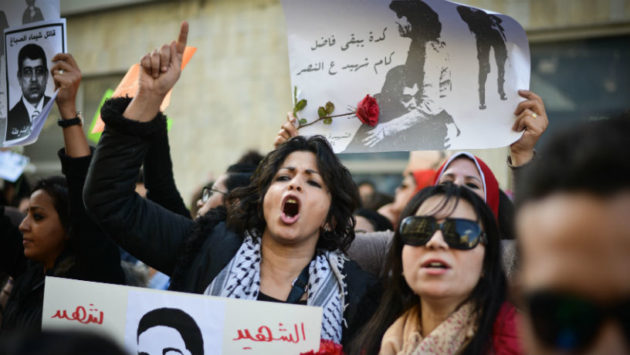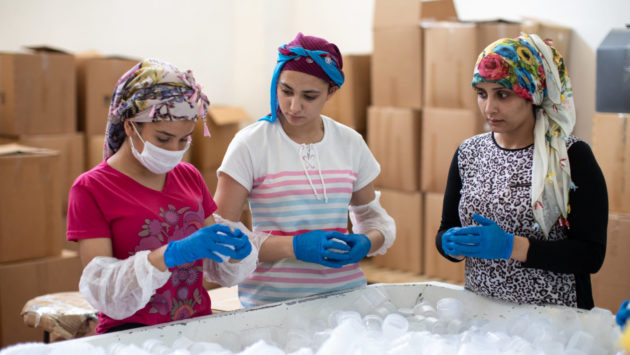Women’s Freedom Organization in Iraq Demands to Amend the “Family Violence Protection Law”
Press Release

Each month, Iraq’s morgues receive dozens of cases of women murdered by the men closest to them: husbands, ex-husbands, fathers, brothers, partners, or fiancés. Most of these cases are filed away to be ignored on the pretext that the violence these men have enacted on these women were to preserve the honor of the family and tribe. These men commit these murders with full impunity. It is the ultimate proof that women are not seen as full citizens with rights, but merely as objects at the disposal of their men, to be owned, enslaved, abused, or even killed by them. There is a strong need for a law to put an end to the government’s negligence on this issue as its disregard for the rise of violence against women leads to the death of almost a thousand women each year.
OWFI, along with several other organization, has been active in the feminist struggle for the past 14 years. Our objective is the protection of women from male violence and the amplification of their voices in our collective demand that her country and its laws respect her humanity and preserve her life. The government has refused to provide legal sanction for the operation and existence of private safe houses and shelters for women. Two years ago, OWFI appealed to the international community at its highest level, bringing demands around the protection of shelters in Iraq to the United Nation’s Security Council. The Council sent a recommendation to the Iraqi government to protect women and permit the operation and accessibility of women’s shelters.
As has been done in the past, the Iraqi government and its parliament drafted domestic violence legislation behind closed doors, without consulting Iraqi feminist organizations on the ground. A discussion between parliament members and members of organizations like OWFI did not take place, neither on the content of the legislation, nor on the effectiveness of it and whether or not it ensures the protection of future generations of women in Iraq. It is irresponsible on the part of the government to draw up these documents without benefitting from the consultation Iraqi feminist organizations can provide.
After the first draft of the domestic violence law was written by the Parliament’s Woman and Child Committee in 2015, the legislation was reviewed and worked on only within patriarchal semi-governmental organizations. It is ridiculous that we were shown a draft only after several, repeated requests for a copy by individuals who felt their responsibility to act. It also comes as a surprise that the U.S. Embassy held a meeting with women’s organizations towards sponsoring this law on the 16th of this month. It is the U.S. invasion of Iraq that created a political and, thus, a social system that is sectarian, tribal, and religiously extremist, where women’s lives are not valued. It is ironic that, on the one hand, it is they who destroyed our psychological and material realities, as well as the foundation upon which civil society is built, and, on the other hand, are now sponsoring the passage of a law for women’s protection.
Despite the anti-woman bias of the government’s legislative body, OWFI has decided to act in accordance with our feminist responsibilites, and to study and analyze the proposed law. Presented here are our observations and objections to it. We want to clarify that we support the adoption of a law that protects women from violence and saves hundreds of women from death annually. This law requires many amendments in order for it to be effective in protecting women rather than serve as yet another means to subjugate women to the demands of the male-dominated family and tribe.
The suggested amendments that were sent to the United Nations Assistance Mission in Iraq on December 2016 is attached to this announcement. Our objections are as follows:
1- The legislation does not acknowledge the existence of violence which is specific against women : The title of the law implies that violence within the family may be directed at any or all members equally, whereas the reality is that the primary victims of family violence are women; Iraq’s morgues can attest to this. Violence between two brothers or between a father and a son cannot be dealt with in the same way that male violence against women is dealt with.
The social norms, religious dictates, and the law’s penal codes all serve to weaken the position of a woman in relation to a man within the family unit. Were she to be a victim of violence, her behavior and morals will be questioned so that the fault lies with her. Hence, the relations within a marriage is not one between equals, but one that is imbalanced; an empowered man and a subjugated woman. The “Family Violence Protection Law” legitimizes this social inequality when it should aim for social equality within the Iraqi family.
Therefore, we propose for the law’s name to be changed to “Protection of Women from Family Violence.”
2- The legislation’s prioritization of family reconciliation over women’s safety: In many sections of this legislation, family reconciliation is prioritized, without mention or consideration of whether or not the victim is still unsafe and subject to violence within the family. Furthermore, there are sections in the legislation that reflect an indifference to a woman’s right to a safe environment; the legislation does not offer her nor her right to a safe environment the official protection of the state. This is also reflected in the limitations placed on how long a woman is allowed to stay in a shelter, after which she is sent back to her husband. We therefore propose that the law is modified to prioritize women’s safety above all.
3- Reform and rehabilitation should be mandated for the aggressor, not the victim: Treating the victim as though she is responsible for the violence enacted against her is to criminalize her. It is a hostile approach to women and survivors of domestic violence, perpetuating the myth that it is she who is responsible for her own abuse and mistreatment, that it is she who wrongfully angered her husband, completely absolving the aggressor of accountability, as though he does not have a will or brain of his own. Although the aggressor has committed a crime, there is no mention of the need for him to reform and rehabilitate socially or psychologically, which only further exemplifies the ways in which the legislators are biased in favor of the man and against the woman. The male bias insists that the source of the crime lies within the woman. The legislation does not aim to prevent male violence against women, but to hide her scars. The law treats women as defective, incompetent, and in need of rehabilitation, whereas the abuser and aggressor is not treated as such, despite being the criminal and, thus, the cause of the crime. This understanding of violence against women is incompatible with the realities on the ground; women are in need of support in the form of shelter that respects her humanity, shelter that OWFI has provided in the last decade. This is in contrast to the government’s shelters, which temporarily removes her from the abusive environment and treats the victim as a criminal, denying her a safe environment for a period long enough to develop herself socially and economically.
Therefore, we propose that the items suggesting reform and rehabilitation for the female victim should be altered to require reform and rehabilitation for the man who suffers from a mental and psychological state that causes him to think it appropriate to enact violence and harm to others to solve his problems.
4- Government shelters serve as new prisons for women: A basic cornerstone of women’s protection and safety in a society is the availability of safe housing and shelters. The drafted legislation approaches women’s sheltering in a casual and shallow way. It has made the Ministry of Interior responsible for sheltering women, as an extension of the department that manages prisons and correctional facilities. The victim is jailed whereas the perpetrator is left free and without serious legal questioning and investigation of the crimes he has committed. There should be a chapter included in the legislation describing the concept of shelters, their purpose and function, rather than lessening the importance of them by using the euphemism “safe haven.” We have heard from other organizations who were pushing for shelters to be referred to as “safe havens” instead, supposedly to protect her dignity and shield her from stigma, but simultaneously allowing those organizations to avoid confrontation with the patriarchal legislators. This is a perhaps inadvertent, but nonetheless harmful attempt to avoid fully confronting the issue at hand: that women need sheltering from male violence specifically and that it is a widespread societal ill that she is needing protection from. Additionally, they use legal terminology for the name of the law following into the footsteps of the KRG laws, instead of one that reflects a feminist vision and is written in rights-based language. This law should grant women’s rights organizations like OWFI the right to run shelters in order to protect women and should ensure full recognition of their role in resolving conflicts, as well as protecting and sheltering women from violence.
5- A third party consultant should be identified to advise and assist women throughout all stages of protection: The law should put in place procedures that will allow for victims of male violence to receive practical, legal, and social support, consult, and advice from a third party of extensive experience in these cases. Women’s human rights defenders and feminist activists should be engaged in this process as they are experienced and competent in advocating for the victim throughout all stages of protection and empowerment.
6- Penalties and measures to prevent the battering and killing of women: The penalties stipulated in the law must be serious in deterring violence against women: either imprisonment for at least a month or the payment of fines and compensation to the victim commensurate with the offense. In the event of death threats, the men who threaten to kill should be imprisoned without delay and provided with psychological and social counseling. The weapon in his possession must be confiscated by authorities directly and not returned to him except after a prolonged period of treatment and the consent of the psychiatrists responsible for administering it. Legislators must also take steps to repeal paragraphs of the Penal Code that allow and tolerate the killing of women on social grounds of male interests and patriarchal superstitions (i.e. “honor” killing).
7- The law mandates the formation of decision-making councils on issues related to the protection of women that will include representatives of the relevant ministries (i.e. Woman and Child Committee). However, there is no suggestion to include representatives of women’s organizations who have the experience, knowledge, and skills to deal with these issues. These competent parties must have the ability to influence decisions made by these councils and be allocated a number of chairs\votes equal to that of ministry representatives. An international advisory body should also be included in this council so as to coordinate with international regulatory institutions.
OWFI has protected and housed more than 500 women who have faced violence and been threatened with death in the last 14 years. We have done so with the support of the international community and the global feminist movement. The time has come for the Iraqi government to recognize the efforts of women’s rights organizations and provide legal sanction and support for OWFI’s shelters that has done the legitimate work required by this law. The efforts that try to keep the mission of sheltering women strictly a governmental authorization cannot be separated from a patriarchal effort that has cared little over the years to ensure a dignified life for thousands of vulnerable women. The fact that hundreds of women have reclaimed their right to such a dignified life with the assistance of OWFI-run shelters is a source of pride for us. We will not give up our right as women’s rights defenders and will not compromise on our role that has saved and will continue to save hundreds and even thousands of women. We therefore call for the inclusion of a paragraph or amendment of a paragraph that ensures the legal right of women’s organizations like OWFI to operate shelters.
We asked the UNAMI Office to organize a public meeting to join both legislators of the Family Violence Protection Law and women’s organizations who have the experience of combatting Violence Against Women, in a similar way that the general meeting on the labor law was discussed in a public meeting between legislators and trade unions. We will not accept the formation of laws behind closed doors that allow lawmakers, quasi-governmental and state-run organizations to pass whatever they want, against the will of Iraqi women. This law affects our lives as women and touches the lives of future generations of females and is the responsibility of everyone who cares about building a sound society that respects all our rights in Iraq.
Yanar Mohammed – President of Women’s Freedom Organization in Iraq




